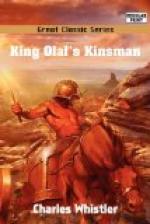Then two spearmen turned and shouted, and went to drive their weapons into the body of my foe, and I put my shield in the way.
“Strike not a fallen man,” I said, and they forebore, ashamed.
Then I loosed the baldric that his sword hung in—his axe was gone as he fell or wrestled—and took the weapon. And lo! it was sword Foe’s Bane, my father’s sword; and I cast away my axe and gripped the well-known hilt, and bade the spearmen guard my captive, and turned back into the fight. And all this had gone by in a whirl, as it were, and the Danes were still striving to regain their lord, while Olaf and Ottar were smiting unceasingly. Only Prat was gone, while now our whole line was of spearmen and vikings mingled, and the Danish line was in no sort of order, but I thought they prepared for another rush on us.
Then it came, and we were driven back fighting; it slackened, and we took our ground again. And then I know not what sign Olaf saw in the faces of the Danes before him, but suddenly he spoke, and our war horns brayed. Then Ottar raised the standard and pointed it forward, and there rose a thundering cheer from our whole line as we charged and swept the Danes before us, spear and axe and sword cleaving their way unchecked. And surely sword Foe’s Bane wiped out the dishonour of biding in a foeman’s power that day.
Then rode our horsemen among the disordered crowd, and that was the end. The Danes broke and fled, and Olaf had won his seventh battle, and I had seen victory at last; moreover the sword of Thorgeir was in my hand.
The light-armed men and the riders followed the flying Danes, and Olaf sheathed his red sword with the light of victory shining on his face, and while the men cheered around us he put his hand on my shoulder and asked if I were hurt.
“I saw you fall, cousin,” he said, “but I could not win to you. The Danes pressed on to reach the man you had down.”
“It was Egil,” I said. “I am not hurt—are you touched?”
And he was not, but it was our good mail that had saved us both. There would be work for the armourer by and by before we could wear it again, for after Egil had fallen I had been beside the king, and there was no lack of blows before the time had come when our charge ended the matter. Only three of his six shield men and two of mine were left.
But Prat was slain, and many another good warrior lay dead where our line had been.
Now when I looked for Egil he was gone. The two spearmen lay where I thought he had been, and I looked to find him slain also. So I asked the men round me, and at last found one who had seen him dragged up by the rush that bore us back. And so he had escaped.
“That is the chance of war,” said Olaf, “but you could not have slain him with honour.”
“Nevertheless,” said Ottar, “Redwald has a sure token there that he overcame him,” and he pointed to my sword.




